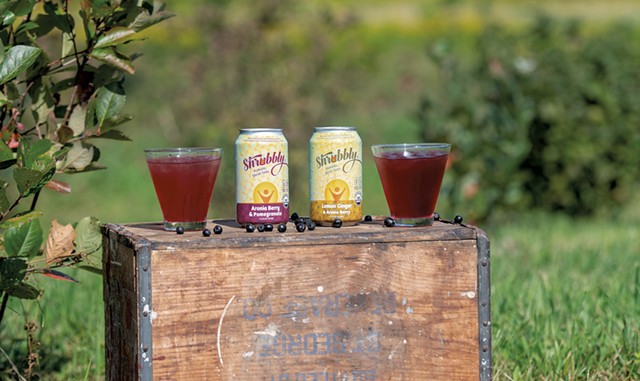
- Daria Bishop
- Shrubbly, a nonalcoholic beverage made with Aronia berries
More than once this summer, I've thrown my hands in the air and said, "It's too hot to cook." On most of those occasions, it's also been too hot to drink.
I love a cold glass of rosé or a crisp, light beer as much as anybody. Recently, though, I've often found myself reaching for a beverage without the booze. And I'm not the only one.
According to a spotlight report released this month by consumer research firm the Hartman Group, "Consumers of alcohol are starting to make more measured assessments of their relationship to, and consumption of, alcohol."
We've been tracking the trend in low- and no-alcohol drinks for a couple years now. As with most beverage booms, Vermont producers are all over it.
As more folks go alcohol-free, they find satisfying, complex alternatives in drinks such as shrubs; sodas made with local fruits and botanicals; and even the state's traditional haying beverage, switchel.
Here are five producers of drinks with spirit — but no spirits — that are ideal for late-summer sipping.
— J.B.
Berry Promising
Shrubbly, Hinesburg, shrubbly.com. $2.99 per 12-ounce can.
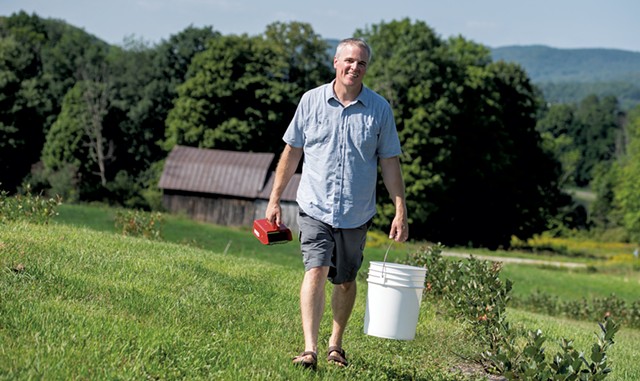
- Daria Bishop
- Matt Sayre walking along the Aronia berry bushes on his Hinesburg farm
Matt Sayre had never heard of Aronia berries until he started researching fruit crops that were resilient in the face of the climate crisis.
"I was just googling, and this study came up that they did well in extremes of cold, wet and dry [conditions] and were pest-resistant," Sayre said. Further digging told him that the plant, native to North America, had high levels of potentially beneficial antioxidants and polyphenols; the latter can function as prebiotics.
Sayre, 46, was explaining how he came to be standing on a Hinesburg hillside among 500 bushes bearing this uncommon fruit. The hot, sunny August afternoon was a perfect moment to crack open a cold can of Shrubbly, the tart carbonated beverage that Sayre developed in 2018 to feature the juice of his Aronia berries. He launched its current iteration in February 2020.
Eaten off the bush, one of the dark purple, not-quite-ripe berries delivered a touch of sweetness with a slightly bitter, tannic edge. The fruit brings its wellness properties, deep violet color and subtle bite to Shrubbly, which comes in two flavors: Aronia berry and pomegranate lightly sweetened with organic honey; and unsweetened lemon, ginger and Aronia berry.
Like the rolling hills of the almost 15-acre Sayre Fields Family Farm, Shrubbly's journey has had ups and downs. But by late summer 2021, the business shows all signs of reaching a new peak.
Sayre recently received word that the U.S. Department of Agriculture has awarded him a $250,000 value-added producer grant to support Aronia production and Shrubbly's market expansion. He is in the process of moving the first step of Shrubbly's production to Nordic Farms in Charlotte, where he also plans to expand his Aronia acreage. He will continue to work with two co-packing facilities in Vermont and New Hampshire for the carbonation and canning steps.
Sayre still wakes up at 5 a.m. to squeeze his fruit growing and fledgling beverage business around a full-time job at the University of Vermont, where he develops educational programs in sustainable food systems. That work influenced his current venture.
While at UVM, Sayre completed all the coursework for a PhD in ecological economics. But instead of writing a dissertation, he said, "I realized that one of the best opportunities for me to help contribute to sustainability and strengthen our community would be to create a green business. I've always had this entrepreneurial drive." He decided that "an organic farm could be one of the greenest businesses that I could start."
When he discovered Aronia berries, the aspiring farmer and entrepreneur was intrigued. After attending an Aronia workshop at the University of Maine in 2012, Sayre drove a U-Haul to the University of Connecticut to pick up 325 bushes in April 2013. He planted those on two acres of the conserved property he and his wife had bought from the Hinesburg Land Trust in 2010.
But what to make with the harvest? "I knew that I wanted to create a shelf-stable, scalable product," Sayre said. He also wanted to create a market incentive for other farms to cultivate the resilient perennial berry.
Sayre was inspired by a raspberry shrub he enjoyed over a lunch meeting at Leunig's Bistro & Café in Burlington. Shrubs are an old-time beverage composed of a syrup of fruit macerated with sugar and vinegar to which one adds other liquids, often plain or sparkling water.
The family combined Aronia berry juice with apple cider vinegar and a touch of honey and topped it with plain seltzer. The Sayres' three girls, now 10, 13 and 16, loved what they called their "fancy drink." The name came naturally: Shrub plus bubbly water led to "shrubbly."
Sayre launched the original version in 2018 on a limited scale to test the market. Startup funding of about $150,000 came from an economic development loan from the Town of Hinesburg and from friends and family.
On February 20, 2020, a repackaged and reformulated Shrubbly hit the market. Sayre had worked with an herbalist to add other fruits, herbs and spices to the Aronia to balance wellness benefits and flavor.
"I brought the first case of Shrubbly right down the road to Lantman's [Market]," Sayre said, referring to Hinesburg's independent grocery store. He had just started selling and delivering to other stores when the pandemic lockdown happened.
"Everything came to a screeching halt, and I had a warehouse full," Sayre said.
He pivoted quickly to direct-to-consumer marketing, putting the word out on Front Porch Forum. His oldest daughter had just gotten her driving permit. "I helped her learn how to drive, and she helped me by driving Shrubbly to people's doorsteps," Sayre said.
Early summer press coverage in AAA's Northern New England Journey magazine brought Shrubbly to the attention of an executive at Hannaford Supermarkets. "I said, 'Jeez, I'm tiny: I just bring the stuff around myself. I don't know if I'm ready for Hannaford,'" Sayre recalled. "She said, 'Well, we'll just start you small in Vermont.'"
By fall 2020, the supermarket account had helped Shrubbly sign with its first major distributor. The beverage is now in about 50 grocery stores, specialty markets and cafés in New England. Production is up to roughly 5,000 cans of each flavor weekly, Sayre said.
Standing among his Aronia bushes, Sayre said the farming side of the project experienced a setback last year when apple borers discovered an appetite for Aronia bushes. He had to prune back all his bushes severely, and he expects a couple years of low harvest before they rebound. But he has at least two years' worth of stored juice — enough to tide him over as Shrubbly's fortunes rise.
— M.P.
Bright Bubbles
Savouré, Bristol, savouremtl.com. $4 per 12-ounce bottle.
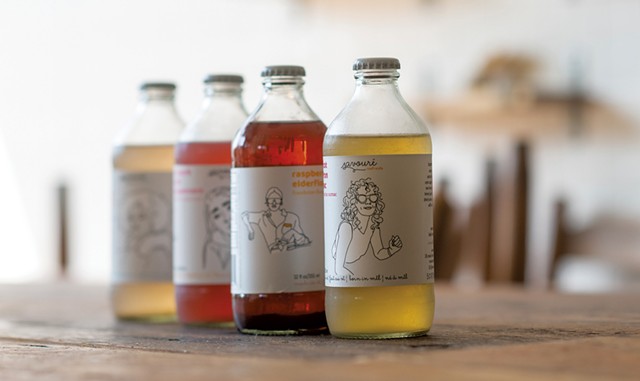
- Caleb Kenna
- Savouré craft sodas
The market for craft drinks has exploded — and gotten a lot more competitive — since Jess Messer launched Savouré in Montréal in 2011. But Messer, 51, who returned to her childhood home in Starksboro with her soda business and her family in 2015, doesn't operate in that particular sphere.
"I'm not a super high-profit, high-output business," she said with a laugh. "I'm a team of one, especially now that my son went back to college."
Savouré stands out in coolers at local shops, farmstands, cafés and restaurants. The squat, stubby, clear 12-ounce bottles somehow become delicate when filled with Messer's rainbow of unusual flavors, which include peach-yuzu-geranium, rhubarb-pink peppercorn and celery-lovage-cardamom.
When Messer started selling the sodas at a Montréal farmers market — originally on tap, later bottled by hand — the market required that 80 percent of the ingredients be grown in Québec. Messer has honored that principle in Vermont, sourcing as much as she can locally.
"My husband sums up my flavor approach as 'high note, low note, off note,'" Messer said. That typically translates to something herby, something fruity and something grounding — often a spice.
She doesn't aim to make each flavor universally pleasing. "It's things that go together and don't totally go together," Messer said. "But they like to hold hands and skip down the street."
Savouré sells seven — soon to be eight — seasonally rotating bottled flavors. For the past few years, Messer has produced the bottled sodas with Joshua Pfeil at A Drop of Joy, a food production and co-packing business in Williston. Her current run size is 3,000 to 4,000 bottles, with an estimated 20 to 25 runs per year.
In addition to the bottles, Messer experiments with small keg batches at Tandem, a production kitchen and multiuse space that she co-owns with Lauren Gammon on Main Street in Bristol.
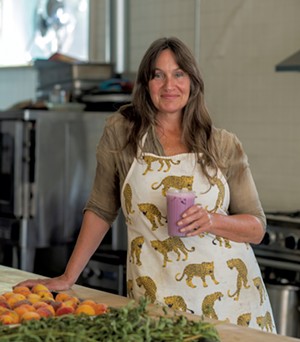
- Caleb Kenna
- Jess Messer
Counting a stack of handwritten recipes, Messer determined that she's made 87 flavors to serve on tap over the years. The keg batches give her wiggle room to play around with "weirdo ingredients," such as handfuls of foraged staghorn sumac and fresh buttermilk (a by-product of Ploughgate Creamery's butter-making process), she said, without the recipe testing and standardization required of bottled products.
Those experiments are often available at local restaurants and events and on tap at Tandem — not on a regular schedule, but whenever the door's open. Messer has also started stocking kegs at her husband's workplace, Beta Technologies. Some contain a more recent project: seltzer.
Messer grew up not being allowed to drink soda, so she doesn't have the nostalgic connection to the drink that so many Americans have — or the sweet tooth.
"For me, sugar is an amplifier more than it is a necessity," Messer said. Given the price point and "weirdness" of her sodas, she knows she's selling them for sipping, not chugging.
She's less precious about the seltzer, however, which she hopes eventually to sell in crushable cans — while still putting "actual food" in it. So far, she's given her seltzers the same type of bold flavors as her sodas: tart cherry and mahleb, peach-urfa pepper-lemon, strawberry-verbena-Sichuan peppercorn, lime-hops-lime leaf, and lemon-lemon balm-sorrel.
"There's nothing subtle or minimalist about my personality: the way I dress, the way I talk, the way I cook, the way I eat," Messer said. "I like big, in-your-face flavor."
Now she's trying to figure out how much flavor seltzer should have, how to can it and whether there's a market for seltzer made with vegetables.
"They actually translate really well to seltzers," Messer said. This summer, she's been making a carrot-nectarine seltzer with carrot peels left over from Gammon's catering jobs and buckets of carrot fronds collected from Footprint Farm's CSA customers during weekly pickup at Tandem.
"It's all the pieces of a carrot that make it a carrot," she said. "And the nectarines are solid, supportive partners for the crazy, weird, spicy, sweet, odd and orange carrots."
— J.B.
Daily Dose
Herb Craft, Middlesex/Montpelier, enjoyherbcraft.com. $2.99 per bottle.
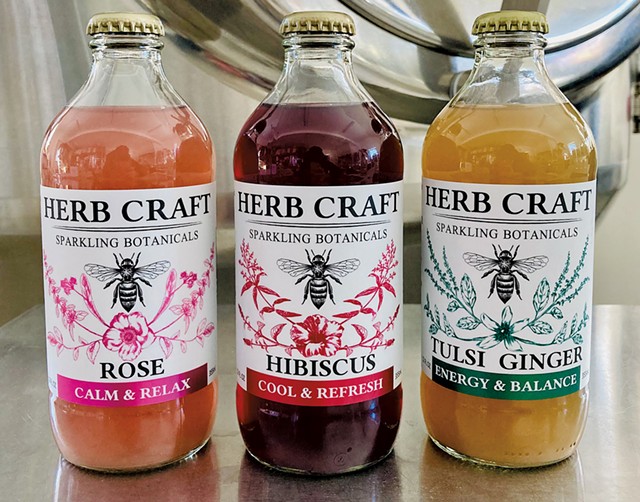
- Courtesy Of Melissa Gewissler
- Herb Craft Sparkling Botanicals
Dejung Gewissler had always leaned toward natural remedies for health and healing. "It was just the mindset that I grew up with," he explained.
When Gewissler, now 44, moved with his family from New Jersey to Middlesex 13 years ago, he landed a position in information technology. But he wearied of his desk job and decided he needed "a life change."
In 2016, he decided to pursue studies at the Vermont Center for Integrative Herbalism, then in Montpelier. "I knew there was an entire forest of knowledge that was out there that I had barely scratched the surface of," he said. "I was kind of thinking that I was gonna go into practice as an herbalist."
But then, observing his own young son, Gewissler saw the limitations of administering herbal remedies in the form of concentrated tinctures.
"Herbs that tasted fine, they went down the hatch," he explained. But many of the most efficacious herbs were bitter or astringent: "They didn't taste the greatest."
Gewissler resolved to develop a product that would encourage people to imbibe beneficial herbs on a regular basis. "It's not medicine," he said. "It's kind of a way of life."
His family consumed many herbal blends in the form of tea, so he started with teas, sweetening them with local honey and adding light carbonation. In 2017, he launched what he called "herbal sodas" as Still Thyme Botanicals, based on the name of the family farmstead in Middlesex.
But Gewissler soon learned that "soda has a bad connotation, especially in the natural food world." People were comparing his beverages with ginger ale and colas, he said. "And that's not what I am."
At the end of 2019, Gewissler and his wife and business co-owner, Melissa Gewissler, rebranded as Herb Craft, calling their products "sparkling botanical beverages." Each of the three flavors delivers what Dejung Gewissler described as "a different herbal action" formulated for a synergy of flavors and benefits.
The tart and herbaceous hibiscus drink, for example, includes peppermint and lemon verbena; all of those ingredients promote cooling of the body and can help with digestion, Gewissler said.
The rose flavor includes lemon balm and linden leaves and flowers, botanicals that can help reduce anxiety and stress. It tastes like heaven for bees and is the company's best seller, Gewissler said: "In this day and age, relaxation is definitely key for everybody."
Herb Craft was gearing up for a sales and marketing push right as the pandemic hit. "I didn't have sales for three months," Gewissler said. "It just dried up."
The drought proved temporary. Sales have since climbed 30 percent over 2020 with expanded distribution into independent grocery stores, co-ops, sandwich shops, cafés and farmstands throughout the Northeast. Herb Craft reached 6,000 bottles brewed, bottled and shipped per month out of a home-based, 800-square-foot production space in Middlesex.
The week of August 23, the Gewisslers took their next big leap with a move into a 3,000-square-foot facility in Montpelier. "It has a loading dock," Gewissler said with evident relief as he anticipated the move. "Right now, I load everything with my tractor."
Everyone helps out with production, Gewissler said, from his parents to the couple's son, now 14. "It's a family affair."
— M.P.
Tropical Tastes
Corina's Switchy, Norwich, drinkcorinas.com. $3.49 per 12-ounce can.
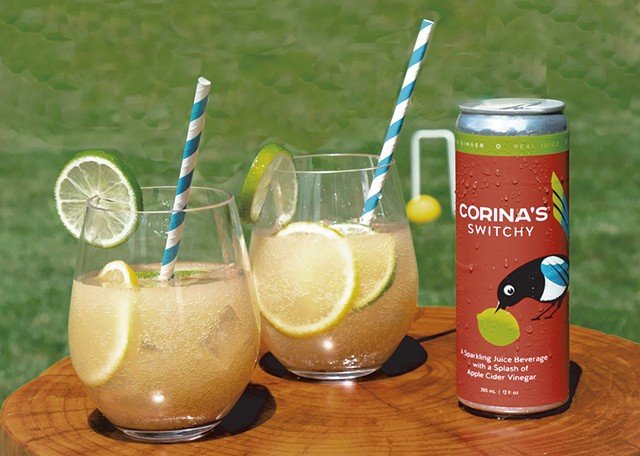
- Courtesy Of Corina's Switchy
- Corina's Switchy
Growing up in Bellows Falls, Corina Belle-Isle drank a lot of apple cider vinegar. Her mother, an eighth-generation Vermonter, put it in and on everything, Belle-Isle said.
Belle-Isle's mom also raised her four kids on regular doses of vinegar — almost straight up. "A glass of water with a splash of vinegar. Drink it down. Be done with it. No complaining," Belle-Isle, 59, recalled. "She'd say, 'It's good for you. It's good for your gut. It helps you with tummy aches.'"
Many years later, in 2017, after a career in finance and owning art galleries, Belle-Isle settled in Norwich. Two years later, with business and life partner Russ Schleipman, she launched Corina's Switchy, made with a splash of apple cider vinegar.
Aside from a hit of acidity, the drink tastes nothing like those doses of vinegar she swallowed as a child, Belle-Isle noted. Her bright, gingery beverage owes as much to her love of the tropics as to her roots in Vermont.
She emphasized that Corina's Switchy is not a switchel, the haymaker's punch of New England. Rather, it comes by its generous portions of fresh lime and ginger juice via switchel's precursor from the Caribbean colonies, where it was called switchy.
Neither switchy nor switchel has bubbles, but Belle-Isle added carbonation. "It drinks like a soda," she said, "but fits into what folks are calling the better-for-you beverage category."
In 2018, encouraged by positive feedback from an international beverage company executive, Belle-Isle took a recipe she'd been making at home and started producing it in kegs. Foam Brewers in Burlington gave her a tap, and brisk sales affirmed she had something worth sharing more widely.
After launching the product in bottles in 2019, she switched to cans in May 2020 with a refined, eye-catching crimson version of her original package design, created by Burlington-based branding company Methodikal.
The pandemic shifted Belle-Isle's sales away from restaurants to direct-to-consumer and retail stores, but she ended 2020 with revenue even with the previous year's, she said. In 2021, retail sales of Corina's Switchy are growing throughout the Northeast, thanks to new distributor partnerships. Although she started with a Vermont facility, Belle-Isle said she outgrew its capacity and now works closely with a New Hampshire co-packer to produce about 20,000 cans per month.
Belle-Isle noted that her switchy features a secret ingredient that is all her own: an aromatic spice from Indonesia. The result is a well-balanced drink that incorporates the tart acidity of her mother's favorite apple cider vinegar but, in the words of one co-op buyer, "doesn't taste like salad dressing," Belle-Isle said.
— M.P.
Switchel it Up
The Yerbary Switchel, Charlotte, yerbary.com. $5-5.50 per 16-ounce bottle.
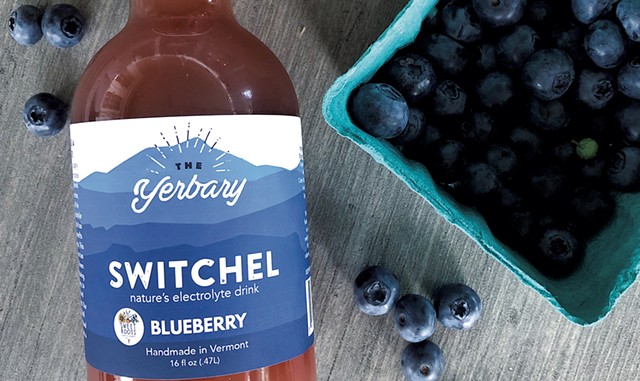
- Courtesy Of The Yerbary
- The Yerbary's blueberry switchel
Last year, Michaela Grubbs' daughter got an unusual sixth-grade homework assignment: Find the plot of land where you live in Charlotte and research how life would have been there in the 1700s.
The family's property has one of the oldest oak trees in town, and Grubbs' daughter discovered that the roughly 450-year-old oak would have been a popular gathering spot for farmers seeking shade while haying nearby fields. And while they were resting, they were probably drinking switchel.
Grubbs, 44, has made switchel for herself and her family for 15 years, combining raw apple cider vinegar, maple syrup, ginger, lemon and water for a refreshing — and traditional — thirst quencher. This summer, she's testing the market for a bottled version to add to her existing product line, the Yerbary.
The Yerbary is known for its apple cider vinegar-based Master Tonic, a spicy take on traditional fire cider. Grubbs' switchel shares ingredients such as vinegar and ginger with that product, but it's a tasty uncarbonated beverage, not a potent health tonic.
Both products came out of the pursuit of wellness on which Grubbs embarked while healing from Lyme disease. While most customers buy Master Tonic in fall and winter, she said, switchel's lemonade-like flavors are perfect for summer.
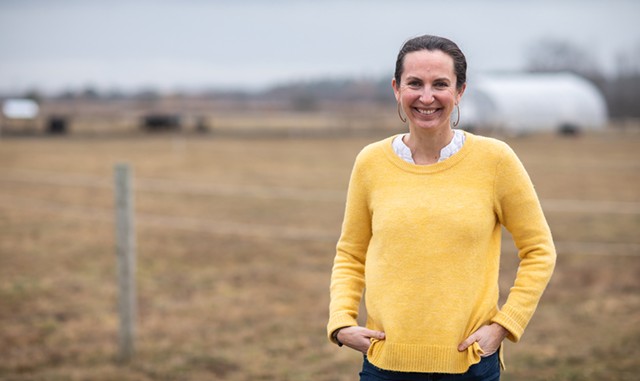
- File: Luke Awtry
- Michaela Grubbs
"I've been a hot yoga instructor for more than 20 years, and I was always on this search for a really good thirst quencher," Grubbs said. "Sometimes you want something a little bit more than water, and 20 years ago, the only thing out there was Gatorade. I just hated Gatorade."
Switchel was exactly what she was after. She's tweaked her recipe over the years — not too sweet, not too vinegary — to find a balance she loves.
"I don't really drink [alcoholic beverages]," Grubbs said. "It just doesn't work for me anymore. So it's exciting to have a good drink that doesn't involve alcohol."
She found herself drinking a lot of switchel when she was pregnant and nursing; now her kids love it, and she fills their water bottles with it for soccer games.
"It's been the greatest drink for all seasons of my life," she said.
Grubbs hoped to start testing the switchel market in 2020, but the pandemic put her plans on pause for a year. Now, she's producing bottles in her certified home kitchen and selling them at the Shelburne Farmers Market, Sweet Roots Farm & Market and Philo Ridge Farm in Charlotte, and lu•lu in Vergennes. The switchel is also on tap at a couple offices in the area.
Grubbs ordered 1,500 bottles for the summer and didn't expect to go through them all, she said, but she did. Now she's looking for a commercial kitchen in the area so she can ramp up production.
Her classic maple-lemon-ginger flavor uses organic ginger and lemon juice, local apple cider vinegar, and maple syrup from wood-fired Patalin's Sugarworks in Charlotte. A blueberry flavor incorporates fruit from Sweet Roots. Currently working on a lime version, Grubbs plans to use other local, seasonal fruit, such as strawberries, next summer.
She estimates that 75 percent of customers who approach her at the farmers market don't know what switchel is. The remaining 25 percent grew up with the drink.
"A couple people have become very nostalgic, and one woman cried," Grubbs recalled. "She said, 'Oh, this tastes like my childhood!' People here get excited about the history of something, and it's really fun."
— J.B.

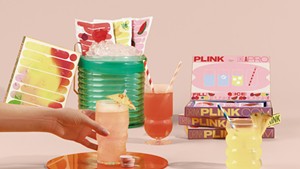
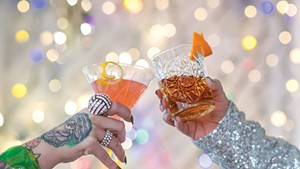
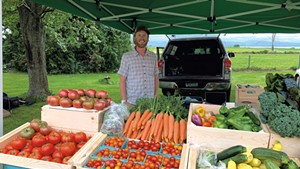











Comments
Comments are closed.
From 2014-2020, Seven Days allowed readers to comment on all stories posted on our website. While we've appreciated the suggestions and insights, right now Seven Days is prioritizing our core mission — producing high-quality, responsible local journalism — over moderating online debates between readers.
To criticize, correct or praise our reporting, please send us a letter to the editor or send us a tip. We’ll check it out and report the results.
Online comments may return when we have better tech tools for managing them. Thanks for reading.